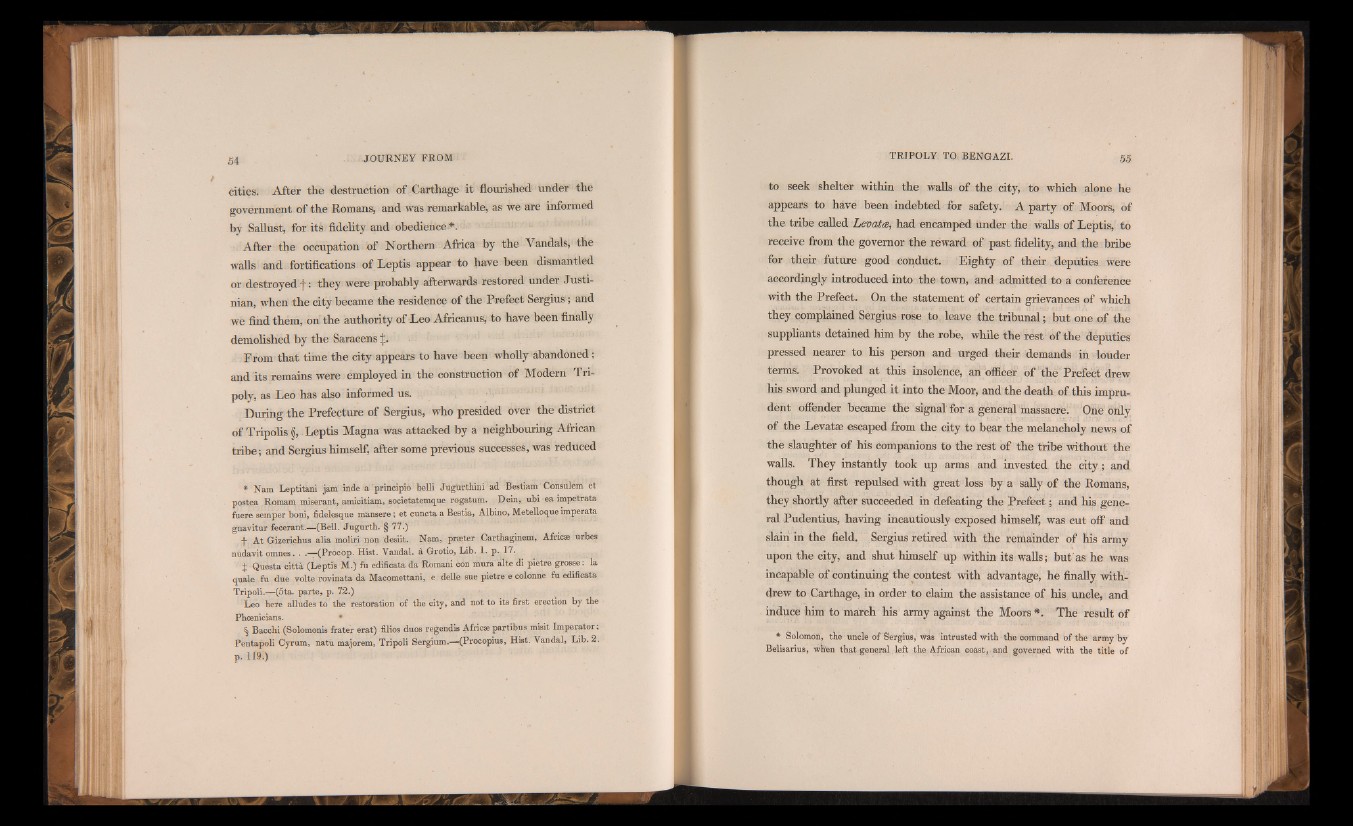
cities. After the destruction of Carthage it flourished under the
government of the Romans, and was remarkable, as we are informed
by Sallust, for its fidelity and obedience *.
After the occupation of Northern Africa by the Vandals, the
walls and fortifications of Leptis appear to have been dismantled
or destroyed f : they were probably afterwards restored under Justinian,
when the city became the residence of the Prefect Sergius' ; and
we find them, on the authority of Leo Africanus, to have been finally
demolished by the Saracens
From that time the city appears to have been wholly abandoned ;
and its remains were employed in the construction of Modern Tripoly,
as Leo has also informed us.
During the Prefecture of Sergius, who presided over the district
of Tripolis É Leptis Magna was attacked by a neighbouring African
tribe; and Sergius himself, after some previous successes, was reduced
* Nam Leptitani jam inde a principiò belli Jugurthini ad Bestiam Consùlem et
postea Romam miserant, amicitiam, societatemque rogatum. Dein, ubi ea impetrata
fiiere semper boni, fidelesque mansere ; et cuncta a Bestia, Albino, Metelloque imperata
gnavitur feceraat.—-(Beil. Jugurtb. § 77.)
*f* At Gizericbus alia moliri non desiit. Nam, prater Carthaginem, Africae urbes
niidavit omnes. . .—(Procop. Hist. Vandal, à Grotio, Lib. 1. p. 17.
x Quésta città (Leptis M.) fu edificata da Romani con mura alte di pietre grosse : la
quale fu due volte rovinata da Macomettani, e delle sue pietre e colonne fu edificata
Trìpoli.—(.‘ita. parte, p. 72.)
Leo bere alludes to tbe restoration of tbe city, and not to its first erection by the
Phoenicians.
§ Bacchi (Solomonis frater erat) filios duos regendis Africae partibus misit Imperator,
Pentapoli Cyrum, natu majorem, Tripoli Sergium.—(Procopius, Hist. Vandal, Lib. 2.
p. 119.)
to seek shelter within the walls of the city, to which alone he
appears to have been indebted for safety. A party of Moors, of
the tribe called Levata, had encamped under the walls of Leptis, to
receive from the governor the reward of past fidelity, and the bribe
for their future good conduct. Eighty of their deputies were
accordingly introduced into the town, and admitted to a conference
with the Prefect. On the statement of certain grievances of which
they complained Sergius rose to leave the tribunal; but one of the
suppliants detained him by the robe, while the rest of the deputies
pressed nearer to his person and urged their demands in louder
terms. Provoked at this insolence, an oflicer of the Prefect drew
his sword and plunged it into the Moor, and the death of this imprudent
offender became the signal1 for a general massacre. One only
of the Levatee escaped from the city to bear the melancholy news of
the slaughter of his companions to the rest of the tribe without the
walls. They instantly took up arms and invested the city; and
though at first repulsed with great loss by a sally of the Romans,
they shortly after succeeded in defeating the Prefect; and his general
Pudentius, having incautiously exposed himself, was cut off and
slain in the field. Sergius retired with the remainder of his army
upon the city, and shut himself up within its walls; but as he was
incapable of continuing the contest with advantage, he finally withdrew
to Carthage, in order to claim the assistance of his uncle, and
induce him to march his army against the Moors *. The result of
* Solomon, the uncle of Sergius, was intrusted with the command of the army by
Belisarius, when that general left the African coast, and governed with the title of